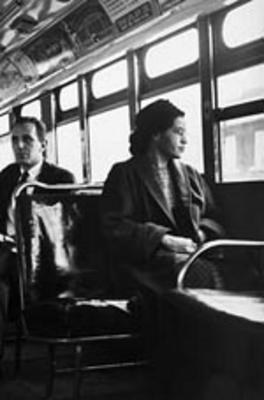
Rosa Parks is dead
Parks was working as a seamstress for the Montgomery Fair department store, and as she waited for the Cleveland Avenue bus to take her home, she let a full bus go by. The Jim Crow laws reserved the first four rows of a city bus for whites and the last 10 for blacks. The seats in the middle could be used by blacks if no whites sought them. But if a white person wanted a seat, the whole row was emptied.
Also, bus drivers in Montgomery made blacks, who were nearly 70 percent of the riders, enter the front door, pay their fare, disembark and re-enter by the back door. Many blacks were left standing, fareless, when the bus driver pulled away before they could reboard.
James F. Blake, the driver of the bus Parks boarded in 1955, had put her off a bus in 1943 when she refused to enter through the back door because the back was jammed. After that, she refused to board any bus he drove, but when the bus pulled up to the Court Square stop, Parks forgot to check who the driver was. She got on and took a seat in the middle section, next to a black man at the window and across the aisle from two women. At the next stop, some white people got on, filling up the seats reserved for them, and one white man was left standing.
"Let me have those front seats," the driver said, indicating the front seats of the middle section. No one moved. He repeated himself: "Y'all better make it light on yourselves and let me have those seats."
The black rider by the window rose, and Parks moved to let him pass by. The two women across the aisle also stood up. Parks slid over to the window. "I could not see how standing up was going to 'make it light' for me," she wrote in her autobiography, "My Story" (1992). "The more we gave in and complied, the worse they treated us.
"I thought back to the time when I used to sit up all night and didn't sleep, and my grandfather would have his gun right by the fireplace, or if he had his one-horse wagon going anywhere, he always had his gun in the back of the wagon," she wrote. "People always say that I didn't give up my seat because I was tired, but that isn't true. I was not tired physically, or no more tired than I usually was at the end of a working day. I was not old, although some people have an image of me as being old then. I was forty-two. No, the only tired I was, was tired of giving in."
The bus driver said he would have her arrested, and she replied, "You may do that." He called the police and waited. Some riders got off, but not everyone, and Parks recalled that it was very quiet. When the police arrived, she asked one, "Why do you all push us around?" She said he replied, "I don't know, but the law is the law, and you're under arrest."
She was bailed out that night, and her boss at the NAACP asked if she would be the test case for a lawsuit. She discussed it with her husband and mother and then agreed. Meanwhile, the leaders of the Women's Political Council mimeographed 35,000 handbills calling for a bus boycott. Black ministers got behind the effort. All 18 black-owned cab companies agreed to stop at all bus stops and charge 10 cents per ride, while others carpooled or walked.
..............
As Parks went into her trial, a young girl called out, "Oh, she's so sweet. They've messed with the wrong one now." The crowd took up the latter half of the cry.
